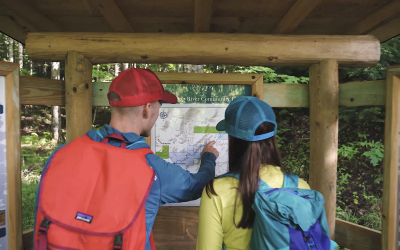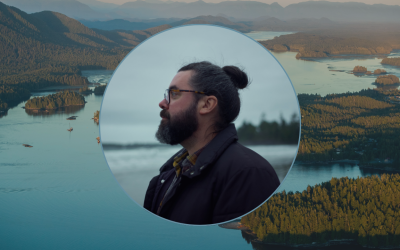These organizations are taking action toward decarbonization and responsible tourism amid climate disruption and COVID-19.
In the twenties, “hope is a moral imperative,” says author Kim Stanley Robinson. His 2020 science fiction novel, The Ministry for the Future, is a vivid story of humanity’s potential responses to global warming. It also explores their consequences.
The novel’s inciting event is the 2015 Paris Agreement on climate. Here, fiction and reality overlap: the world’s places, people, and industries have a precious few years to decarbonize and avoid the worst of climate disruption. Without spoiling the plot, the story begins as a new branch of the United Nations is commissioned to lead climate action with the purpose of “defending all living creatures present and future who cannot speak for themselves.” No matter their focus – be it scientific, legal, political, economic or otherwise – all characters struggle to live up to this mission. Their actions are often imperfect, inadequate and marked by grief. But in the long run, they don’t give up. People feel the most hopeful when they work toward common goals.
The book mirrors reality. The coming years will require hopeful, courageous acts from tourism and travel leaders like you. As the pandemic continues, tourism restarts are going to be uneven and messy. Some places – especially those where outbreaks are the most severe, and where vaccines are not yet available – may not be able to welcome visitors for some time.
While the global challenges of the pandemic and climate change are truly complex, every tourism destination can be a part of greater solutions. We at Destination Think want to recognize places and organizations that are taking real steps toward decarbonization and responsible travel as they shape the next era of tourism.
May this growing list of examples inspire you and your tourism colleagues to take action.
Decarbonization and climate action
The decarbonization of tourism in action: The case of Valencia – Valencia, Spain has made a commitment to become carbon-neutral by 2025. It has become “the first global destination to verify the calculation of the carbon footprint of its tourism activity, in addition to calculating and soon certifying its water footprint.”
France to ban some domestic flights where train available – The French government has made a decision to reduce the number of short-haul flights.
Intrepid Travel prioritizes decarbonized tours amid tourism’s recovery – A carbon-neutral company since 2010, Intrepid Travel has become the “first and only tour operator in the world with verified science-based climate targets, operating in line with a 1.5°C future championed by the historic 2015 Paris Agreement.” Among other actions is a commitment, by 2022, to eliminate flights less than 90 minutes for its top 50 trips.
Tourism Declares a Climate Emergency – All signatories, including Destination Think, commit to five actions, among which is to reduce carbon emissions to 55% below 2017 levels by 2030, in line with current IPCC advice.
Several DMOs have signed on, including Oregon Coast Visitors Association, Thompson Okanagan Tourism Association, Visit Gloucestershire, and Visit Scotland. Join the coalition.
Global Sustainable Tourism Council’s (GSTC) Destination Criteria – GSTC-certified destinations are those that comply with “the highest social and environmental standards on the market.” For example, in 2017, Vail, Colorado became the first certified sustainable mountain resort destination in the world and the first certified destination in the United States.
Ljubljana, Slovenia – A large, central car-free zone, easy public access to green spaces, and prolific beekeeping are all evidence of Ljubljana’s commitment to sustainability. The city was named the European Green Capital in 2016 and appears in the Sustainable Top 100 Destinations list.
Tasmania to become a carbon-neutral destination by 2025 – The Premier of Tasmania has announced plans to assist tourism recovery, including a goal of carbon neutrality by 2025. To help reach this goal, the government offers funding for tourism operators to complete a carbon audit of their operations.
Visit Norway’s National Tourism Strategy 2030 to reduce carbon emissions by 50% – This goal is aligned with the advice of the IPCC to avoid worst-case climate scenarios. Norway’s strategy includes the development of a “Klimasmart” calculator to help destinations and operators estimate the environmental impact of tourism experiences and make meaningful emissions reductions based on those numbers.
Report: The carbon footprint of Auckland tourism – Following its first climate change and sustainability report, released in 2020, the New Zealand city of Tāmaki Makaurau Auckland has measured the carbon footprint of its tourism industry to create a baseline for emissions reductions.
Cumbria, U.K’s carbon baseline – With an ambition to become the U.K.’s first carbon-neutral county, Cumbria has been measuring its carbon footprint, including emissions from visitation, since 2012.
How Nelson Tasman is leading the charge in carbon-neutral tourism – Nelson Tasman wants to become New Zealand’s most sustainable destination. Steps already taken include the creation of New Zealand’s first Zero Carbon Itinerary. Local businesses are also working towards zero carbon or climate-positive status.
Several operators and destinations take action to decarbonize – Take inspiration from places like Copenhagen; Queensland, Australia; Bhutan; and Guyana. Guyana’s national government has taken action to address tourism’s impact on climate through two implementation strategies. The tourism sector has followed by committing to creating a Climate Adaptation and Resilience Strategy, in alignment with national goals.
Who else belongs on this list? Send your suggestions to the editor.
Responsible travel and local support
Visit Omaha’s Rent for Recovery program – Visit Omaha is letting go of its rented office space and will instead rent meeting space each week “to support businesses hit hardest by the pandemic.”
Department of Tourism Vanuatu Launches Tourism Business Support Program – To encourage “principles of sustainable and responsible tourism,” Vanuatu’s crisis response program provides Tourism Business Survival Grants as well as subsidies for renewable energy and agritourism programs.
Tallinn vies for remote workers – Estonia has long been courting tech-savvy visitors through its e-Residency program, the first of its kind. The destination gains the potential for long stays by digital nomads, less carbon burned, and greater economic benefit per visitor.
London, U.K. launches domestic travel campaign – “In a normal year, Brits make over 93 million overseas trips. Six in 10 of them will be swapping to a domestic one.” London & Partners makes the case for near-in travel.
It’s oh so quiet: silent whale watching on Iceland’s first electric boat tour – In Húsavík, Iceland, a whale watching company powers its retrofitted vessels using “the 100% renewable hydro and geothermal energy that powers most of Iceland.” To encourage carbon-neutral sailing, the operator has also offered blueprints to its competitors.
Sleeper trains return to Europe – As demand for sustainable travel rises, overnight rail routes are gaining momentum in continental Europe. There is also an ambition to build a new sleeper train service through the Channel Tunnel between the U.K. and France.
Colorado electrifies its scenic byways – All of Colorado’s 26 Scenic & Historic Byways will soon be equipped with charging stations to enable low-carbon road trips through the state’s most picturesque locations.
VisitScotland’s Responsible Tourism Plan – Scotland’s national tourism organization has perhaps one of the world’s most robust, holistic strategies toward decarbonization and responsible travel. Its 2030 strategy commits to many destination management efforts that place the local quality of life, the quality of experiences, and natural environmental at the centre of tourism’s success. VisitScotland has also declared a climate emergency and seeks to “develop as a climate conscious organization.”
Oregon Coast Visitors Association hosts Tourism and Climate Action Watch Party – In advance of the UN Climate Change Conference, COP26, in Glasgow, tourism stakeholders of the Oregon Coast were invited to discuss climate change and tourism following a keynote presentation by Jeremy Sampson, CEO of the Travel Foundation, Chair of the Future of Tourism Coalition, and a key organizer of Tourism Declares a Climate Emergency.
Aspen Destination Management Plan makes resident well-being a high priority –This five-year plan (2022-2027) from Aspen Chamber Resort Association is a result of extensive resident engagement, and it marks a commitment to co-creating tourism’s next chapter with resident well-being at the core. During a process led by Destination Think, local input helped to outline “The Aspen Challenge” and insights leading to three strategic pillars:
- Address Visitor Pressure
- Enhance the Aspen Experience
- Preserve Small-Town Character
What is your connection to a more responsible, decarbonized future of travel? “We are all living in a science fiction novel we are co-authoring together,” Robinson says. But our messy story doesn’t need to be a dystopia. There is a tale of hope and courage ahead for the world and for the tourism industry, so long as actions like these continue to gain momentum.
Our team is always looking out for stories of today’s most responsible, decarbonizing destinations. Who else belongs on this list? Please send your suggestion to the editor or tell us in the comments below.
March 15, 2022 update: Added stories about Guyana’s national plans, and Oregon Coast watch party, and the Aspen Destination Management Plan.
August 16, 2021 update: Added stories and VisitScotland and Nelson Tasman, New Zealand.
July 8, 2021 update: Added stories about Auckland, New Zealand and Cumbria, U.K. measuring their emissions.
June 17, 2021 update: Added a story about Norway’s National Tourism Strategy 2030.
June 4, 2021 update: Added stories about Tasmania, sleeper trains in Europe, and Colorado’s scenic byways.
Feature image credit: Jamie Spaniol, Unsplash










Tilma Group are Australian tourism consultants who help regional, rural and remote destinations and events learn how they can maximise the benefits they receive from tourists.
We have undertaken Global Sustainable Tourism Council training and we are a Future of Tourism signatory.
Our commitment to sustainable and responsible tourism, and how we help our clients be climate-friendlier, is articulated on our website at http://www.tilmagroup.com.au/sustainability
Thanks for sharing this, Kushla. It’s great to see more and more people committed to helping the tourism industry learn about the gravity of this moment and the changes that it demands.
-David